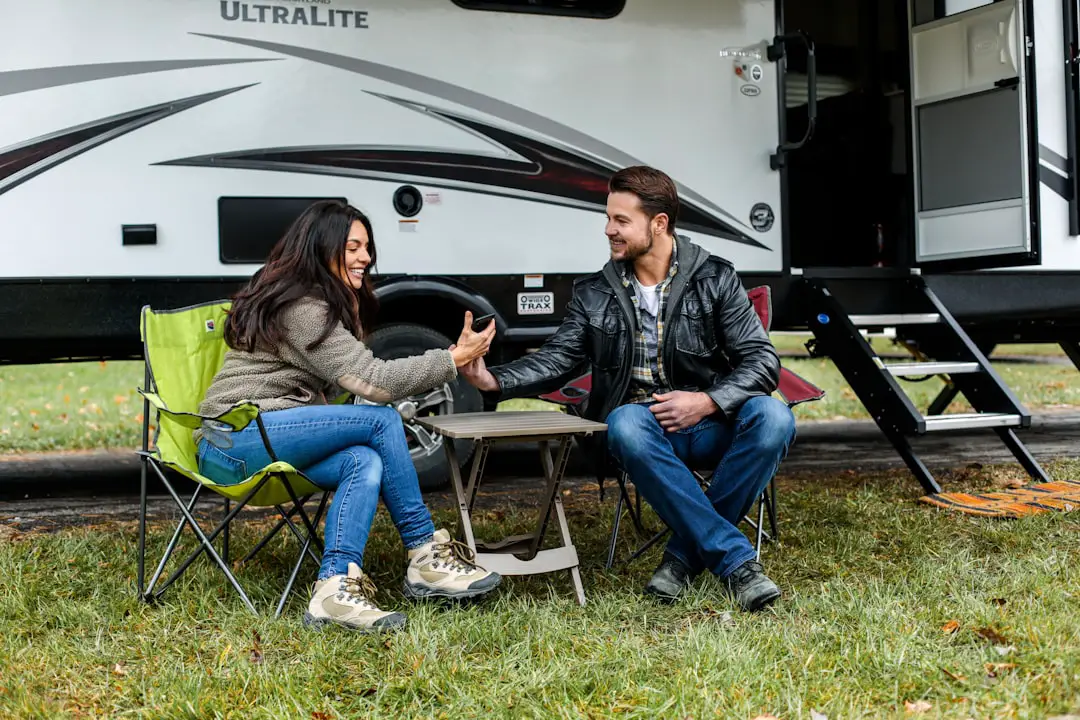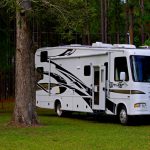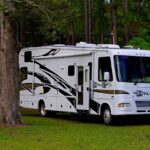Quick Answer: Type B RVs, also known as camper vans, are compact motorhomes that offer the convenience of a kitchen, bathroom, and bedroom in a smaller package. They are nimble, easy to drive, and can be used as a daily driver and off-roading adventure vehicle. On the other hand, Type C RVs, also known as mini motorhomes, provide more interior living space and exterior storage. They are larger and offer more amenities, making them suitable for longer trips and larger families.
Are you considering purchasing an RV but confused about the different types available? You’re not alone! The world of recreational vehicles can be overwhelming, especially when it comes to understanding the differences between Type B and Type C RVs. But fear not, because we’re here to break it down for you and help you make an informed decision. So buckle up and let’s dive into the world of RVs!
Table of Contents
- Quick Answer
- Quick Tips and Facts
- Background: Understanding Type B and Type C RVs
- Type B RVs: Compact and Versatile
- Type C RVs: Spacious and Family-Friendly
- Comparing Type B and Type C RVs
- Pros and Cons of Type B and Type C RVs
- FAQ
- Conclusion
- Recommended Links
- Reference Links
Quick Tips and Facts
- Type B RVs, also known as camper vans, are compact motorhomes that offer the convenience of a kitchen, bathroom, and bedroom in a smaller package.
- Type C RVs, also known as mini motorhomes, provide more interior living space and exterior storage.
- Type B RVs are nimble, easy to drive, and can be used as a daily driver and off-roading adventure vehicle.
- Type C RVs are larger and offer more amenities, making them suitable for longer trips and larger families.
- Type B RVs are self-contained, providing necessities to live comfortably for several days without external connections.
- Type C RVs are typically built on a truck or van chassis and have a distinctive cab-over bunk area.
Background: Understanding Type B and Type C RVs

Before we dive into the specifics, let’s take a moment to understand the background of Type B and Type C RVs. These classifications are part of the RV industry’s system for categorizing motorhomes based on size, features, and amenities.
Type B RVs, also known as camper vans, are the smallest motorhomes available. They are built on a van chassis and offer a compact and versatile living space. Type C RVs, on the other hand, are larger and provide more interior living space and exterior storage. They are built on a truck or van chassis and have a distinctive cab-over bunk area.
Now that we have a basic understanding, let’s explore the unique features and benefits of each type of RV.
Type B RVs: Compact and Versatile
Type B RVs, or camper vans, are the perfect choice for those seeking a compact and versatile motorhome. These vehicles are built on a van chassis, making them nimble and easy to drive. They offer the convenience of a kitchen, bathroom, and bedroom in a smaller package.
Features and Benefits of Type B RVs
✅ Compact Size: Type B RVs are smaller in size compared to other motorhomes, making them easier to maneuver and park in tight spaces. You can take them anywhere you can park a car or van.
✅ Versatility: Type B RVs are not only great for camping trips but also serve as a daily driver. They can be used for off-roading adventures, thanks to options like 4WD, all-wheel drive, and lifted tires.
✅ Self-Contained: Type B RVs are self-contained, meaning they provide all the necessities to live comfortably for several days without external electrical, water, or sewer connections. They typically come equipped with a freshwater tank, a gray water tank, and a black water tank.
✅ Amenities: Despite their compact size, Type B RVs offer a range of amenities. You can expect to find a kitchenette with a refrigerator, a cooktop, and a sink. Some models even have a small bathroom with a shower and a toilet.
✅ Fuel Efficiency: Type B RVs are known for their fuel efficiency compared to larger motorhomes. This can save you money on gas during your travels.
Examples of Type B RVs
- Thor Motor Coach Twist
- Jayco Swift
- Tiffin Motorhomes Cahaba
- Airstream Interstate 19
- Entegra Coach Ethos
Type C RVs: Spacious and Family-Friendly
If you’re looking for more interior living space and exterior storage, Type C RVs, or mini motorhomes, are the way to go. These motorhomes are larger than Type B RVs and offer more amenities, making them suitable for longer trips and larger families.
Features and Benefits of Type C RVs
✅ Interior Space: Type C RVs provide more interior living space compared to Type B RVs. They often have a separate bedroom, a larger kitchen, and a spacious living area. This extra space allows for more comfort during extended trips.
✅ Cab-Over Bunk: One of the distinctive features of Type C RVs is the cab-over bunk area. This space provides an additional sleeping area, making it ideal for families or groups of friends.
✅ Exterior Storage: Type C RVs offer more exterior storage compartments, allowing you to bring along all your camping gear, outdoor furniture, and other essentials.
✅ Amenities: Type C RVs come with a range of amenities, including a full kitchen with a refrigerator, a stove, a microwave, and a sink. They also have a bathroom with a shower, a toilet, and a sink.
✅ Sleeping Capacity: Type C RVs can accommodate more people compared to Type B RVs. Depending on the model, they can sleep anywhere from four to eight people comfortably.
Examples of Type C RVs
- Winnebago Minnie Winnie
- Jayco Redhawk
- Thor Motor Coach Chateau
- Forest River Sunseeker
- Coachmen Leprechaun
Comparing Type B and Type C RVs
Now that we’ve explored the features and benefits of both Type B and Type C RVs, let’s compare them side by side to help you make an informed decision.
| Aspect | Type B RVs | Type C RVs |
|---|---|---|
| Size | Smaller | Larger |
| Maneuverability | Easy to drive and park | Requires more clearance height |
| Fuel Efficiency | More fuel-efficient | Less fuel-efficient |
| Interior Space | Compact | More spacious |
| Exterior Storage | Limited | More storage compartments |
| Sleeping Capacity | Typically sleeps 2-4 people | Typically sleeps 4-8 people |
| Amenities | Basic amenities | More amenities and features |
| Cab-Over Bunk | Not available | Provides additional sleeping area |
| Off-Roading Capability | Suitable for off-roading adventures | Limited off-roading capability |
It’s important to consider your specific needs and preferences when choosing between Type B and Type C RVs. If you value maneuverability, versatility, and fuel efficiency, a Type B RV might be the perfect fit for you. On the other hand, if you prioritize interior space, amenities, and sleeping capacity, a Type C RV might be more suitable.
Pros and Cons of Type B and Type C RVs
To help you weigh your options, let’s take a look at the pros and cons of both Type B and Type C RVs.
Type B RVs
Pros:
- Compact size and easy maneuverability
- Versatility as a daily driver and off-roading vehicle
- Self-contained for off-grid camping
- Fuel-efficient
- Lower price point compared to Type C RVs
Cons:
- Limited interior space and storage
- Smaller sleeping capacity
- Basic amenities compared to Type C RVs
Type C RVs
Pros:
- More interior living space
- Additional sleeping areas with cab-over bunk
- More amenities and features
- Suitable for longer trips and larger families
- More exterior storage compartments
Cons:
- Larger size and less maneuverability
- Lower fuel efficiency compared to Type B RVs
- Higher price point compared to Type B RVs
FAQ

Which is better, Type B or Type C RV?
The answer to this question depends on your specific needs and preferences. If you value maneuverability, versatility, and fuel efficiency, a Type B RV might be the better choice for you. On the other hand, if you prioritize interior space, amenities, and sleeping capacity, a Type C RV might be more suitable.
Read more about “Unveiling the Spectrum: Exploring the 11 Distinct Types of RVs … 🚐”
What is the difference between a Type B and Type C RV?
The main difference between Type B and Type C RVs lies in their size, interior space, and amenities. Type B RVs are smaller, more compact, and offer basic amenities. Type C RVs are larger, provide more interior living space, and offer additional amenities and features.
Read more about “Unveiling the Spectrum of RV Models: A Comprehensive Guide for 2024 🚐”
Is a Type B RV worth the money?
Whether a Type B RV is worth the money depends on your individual circumstances and preferences. If you value the compact size, versatility, and fuel efficiency of a Type B RV, it can be a worthwhile investment. However, if you require more interior space and amenities, a Type C RV might be a better choice.
Read more about “🏆 Unveiling the Absolute Best Quality Class A RVs of 2024! [25 in Total!] 🚍”
What does Type C mean for an RV?
Type C refers to a classification of motorhomes based on size and features. Type C RVs, also known as mini motorhomes, are larger than Type B RVs and offer more interior living space and exterior storage. They are built on a truck or van chassis and typically have a distinctive cab-over bunk area.
Read more about “What is the Least Expensive RV to Buy in 2024? 🚐💰”
Conclusion

In conclusion, the difference between Type B and Type C RVs lies in their size, interior space, and amenities. Type B RVs, or camper vans, are compact and versatile, offering the convenience of a kitchen, bathroom, and bedroom in a smaller package. They are nimble, easy to drive, and can be used as a daily driver and off-roading adventure vehicle. On the other hand, Type C RVs, or mini motorhomes, provide more interior living space and exterior storage. They are larger and offer more amenities, making them suitable for longer trips and larger families.
When choosing between Type B and Type C RVs, consider your specific needs, preferences, and budget. Think about the size of your travel group, the length of your trips, and the amenities you prioritize. By carefully weighing your options, you can find the perfect RV that suits your lifestyle and enhances your adventures on the road.
Safe travels and happy RVing!




